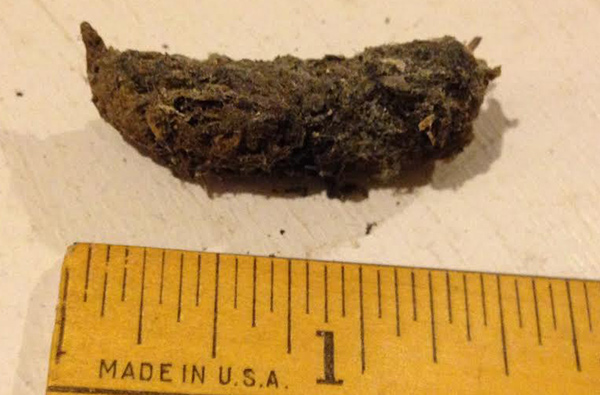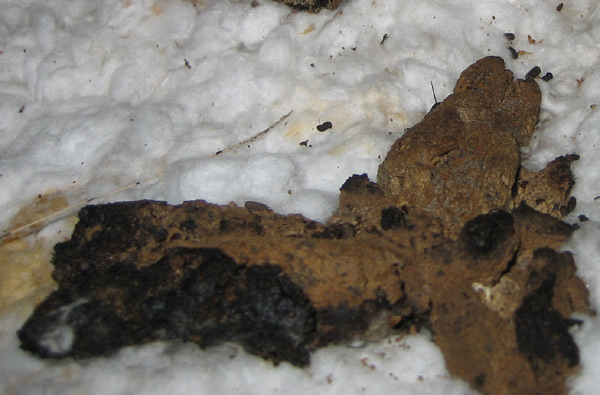- info@wildlife-removal.com
Call us for help in your town
Wildlife Removal Education
Skunk Poop Pictures
Need skunk removal in your hometown? We service over 500 USA locations! Click here to hire us in your town and check prices - updated for year 2020.
Skunks are omnivores. Their feces are fairly indistinct. It looks.... brown and somewhat mushy? It's maybe the size of a house cat, but not as well-formed. You might find
berries in it, or insect exoskeletons. A better clue about the presence of a skunk, of course, is not the poop odor, but the anal gland spray odor! If you need skunk help, click the nationwide directory of Professional Wildlife Removal Companies, and you'll find a skunk expert in your town or city.

Skunk species varies in size and weight; different regions of the world have different types of skunks who leave behind roughly the same type of skunk poop. Its length varies from 4o cm to 95 cm, and its weight is around 0.50 kg to o.75kg, but spotted skunks may weigh around 8.3 kg, which are also called Hog-nosed skunks. They have relatively elongated body shapes with relatively short, but well developed-muscled legs and long front claws which are usually for digging.
Although the color, for most common skunks is black and white, but some skunks are brown or grey and few others are cream-colored. All skunks are usually striped, even from birth. They have a thick stripe across back and tail, two thinner stripes, or they may have a series of white spots looks like broken stripes (in the case of spotted skunk). Some of them also have stripes on their legs too. The skunk feces does not have stripes.
Skunks are basically omnivorous that means eating both plants and animal material and they also change their diets as the season changes. They also eat larvae and insects, grubs, lizards, rodents, salamanders, earthworms, snakes, frogs, birds, moles and eggs. In settled areas, they also eat garbage left by humans. Very often, they may find themselves as acting like scavengers. That means eating rodent carcasses that are left by cats and other animals and birds. Many pet owners, particularly those who have cats, might experience a skunk finding its way into their garage or may be basement where the pet food is kept. Skunks very commonly dig holes in sand or lawns for the search of worms and grubs.
Skunks are also one of the major predators of honeybee, infact relying on their thick fur of their body to protect them from stings. Skunk scratches infact at the front of the beehive and eats many guard bees that actually come out to investigate. Usually mother skunks are known as teachers that teach this kind of behavior to their young.
But in many circumstances skunks are very harmful for many purposes, like for instance, they damage seeds, vegetables and other farming stuff, which in result may spoil them and can make the land a barren one. Skunks also can harm yards or lawns of the houses, especially that which are generally maintained by the residents. Skunks are not usually
important vectors of skunk diseases, but they can carry rabies. Read about Are Skunks Dangerous To Pets - not really, except maybe if your dog eats skunk feces.
Like for example, if someone spends a lot of money on gardening, he/she will definitely not want to waste money and effort as well, this is one of the very serious issues faced by the residents of different areas because of the presence of skunks in their gardens. Another most important issue that people want to get rid of skunks is that they are very smelly, in a sense, they spread disgusting kind of smell, which for humans, become almost unbearable to smell. Then another reason why people get offended to have them in their area, is that skunks eat small chicks and birds and even small animals that are kept at home with passion, residents don’t want their pets to be harmed by this tiny smelly creature because in this way, skunks actually damage their feelings as well, by giving harm to their pets, because pets and birds are like a life for humans.
So for the safety from skunks, bright light in the porch or garage or a shed is very effective precautionary measure, light makes skunks run away, because skunks usually enter these areas in the darkness, so brightness can restrict skunk entering these areas. At night, installing small light bulbs in the field can also help in stopping skunks to enter.
Another very important measure is the elimination of food, that means cleaning the food particles from the garage, or hiding the cat food inside the home, because skunks usually go in that areas where food is easily available for them. Removing food items can be another precaution for avoiding skunks to come in.
Then closing the gates of the shed is another area where we can prohibit skunks entry, this also includes closing all gaps, spaces that can be found near or under walls, or entrance gates etc. This won’t allow skunks to get in easily because of closing all possible tracks of entrance.
Installing fence around the garden of the yard is another measure that can avoid skunks to sneak through, metal fence or can be by making walls of three, four feet can also help in preventing the garage of yard from skunks.
These above mentioned measures will restrict skunks to enter in garage areas, fields, yards or small sheds. These measures don’t harm skunks; they are just the ways to protect skunks from entering in the yards, here the purpose is to save the occupied area and not harming skunks as well, like by using electric current wires, or repellents or giving poisonous food or trapping them through a skunk trap; will definitely harm of kill skunks, because we don’t want to harm skunks, just for the sake of protecting our territory.

For more information on skunk droppings, and for a recipe to remove skunk poop odor, go to my skunk removal information page.


















